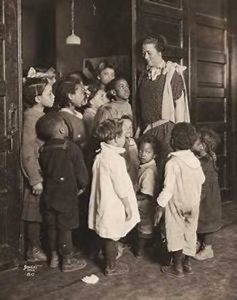
Gertrude Brown
On this date, we celebrate the birth of W. Gertrude Brown in 1888. She was a Black advocate for racial justice for children and women.
Although little is known of her formative childhood years, Brown’s Charlotte, North Carolina, education certainly impacted her values and career. From 1906 to 1911, then known as Willie G. Brown, she was enrolled at Scotia Seminary in Concord, NC. The Presbyterian Church founded this school to educate newly freed Black girls; Mary McLeod Bethune graduated.
The curriculum was designed for black women in the South to learn and serve their people through education. After graduating in 1911, Brown became a teacher in the Charlotte public school system, where she spent six years. She entered social work as a friendly visitor for the Associated Charities for two summers, then worked at the Traveler’s Aid desk for another year, all in her hometown. Brown founded the first hospital for African Americans in Charlotte and the city’s Sabbath School Association. While working in these capacities, she continued her education.
Brown took courses at the Agricultural and Technical College in Greensboro in 1913, the Cheyney Institute for Teachers in Pennsylvania in 1915, and Hampton Institute in 1918. In 1919, she moved to Dayton, Ohio. There, she worked at the Linden Community Center, first as Director of Girls and Women’s work for three years, then as executive secretary for two more years until 1924. She was also executive secretary of the Federation of Social Services for Negro Women in Dayton. Continuing her education, Brown studied at the Playground and Community Center in Atlanta, GA., in 1919 and in Chicago in 1920. In 1923, she received a B.S. from Columbia University.
In the fall of 1924, W. Gertrude Brown moved to Minneapolis to head the Phyllis Wheatley Settlement House. While directing the programs there, she took summer courses at Oxford University and traveled in circles with those interested in combating racism in America. The Paris Conference of Settlements was held in June of 1926 and attended by 250 delegates from twenty countries. Brown was one of about 30 American representatives who came away excited about the show of peace and cooperation from delegates worldwide. Unfortunately, even among her white colleagues, she would remain a second-class citizen and be viewed as having questionable ideas back in the United States.
She resigned as director of the Phyllis Wheatley House in 1937 and moved to Washington, D.C. W. Gertrude Brown died in an automobile accident in 1939.
Black Women in America An Historical Encyclopedia
Volumes 1 and 2, edited by Darlene Clark Hine
Copyright 1993, Carlson Publishing Inc., Brooklyn, New York
ISBN 0-926019-61-9